As the application deadline for the Computational Science, Engineering, and Mathematics (CSEM) Fall 2021 program inches ever closer, Ph.D candidate, Ivana Escobar describes her journey to the Oden Institute and beyond.
Ivana Escobar is a Ph.D candidate in the CSEM program at the Oden Institute. She is working in the Computational Research in Ice and Oceans (CRIOS) Group on data assimilation and sensitivity analysis of ocean circulation using high resolution models. I first heard about the Oden institute while interning at a national lab during my Masters degree. Dr. Mary Wheeler came to give a guest lecture and she posed her methods in a way that was comprehensive and left little to speculation. It was a first for me, since most talks I had heard in the years before seemed detached and unwilling to connect the dots between multiple fields of work. From then on, I noticed that the PhDs at the labs were the ones that were getting to work on innovative projects with people from all over the world.
That summer was the first time I was able to be a part of a broad research community. I thrived when working alongside experts in fields I’ll never master on my own. I asked mentors and friends about program recommendations, and most of them pointed me to Texas and the Oden Institute. I applied to the Oden Institute alone and decided if I got in I would pursue a Doctoral degree, otherwise I would pursue a professional career in engineering analysis. I have been grateful to be a part of this diverse community ever since. The first year of courses was full of new learning opportunities. My classmates came from backgrounds unique from my own which has helped me in being exposed to so many different perspectives. Even my own research group, CRIOS, is full of people from diverse backgrounds and expertise. There have been plenty of times when I haven’t understood the ocean flavor of fluid dynamics. I have never felt embarrassed or scared to reach out for help to a member of CRIOS. The converse happens too, which is my best measure of personal progress. We help each other progress to be the state-of-the-art in our field.
